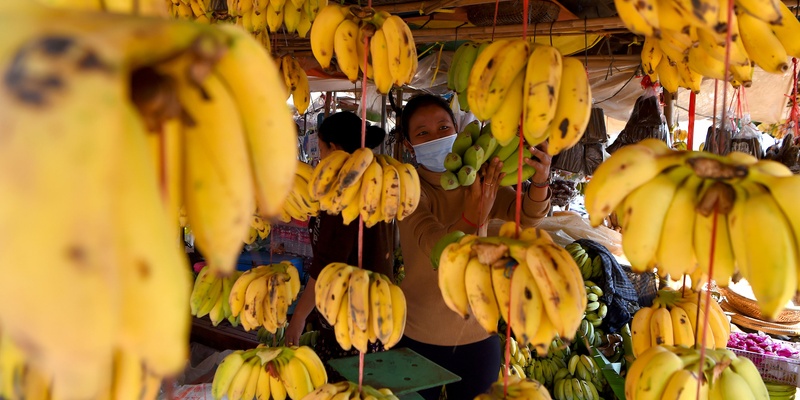IPPC and Group of Latin America and the Caribbean strengthen collaboration against Fusarium Tropical Race 4
Posted on Tue, 11 Jul 2023, 07:21

© FAO/Tang Chhin Sothy
Rome, 5 July 2023 – The International Plant Protection Convention (IPPC) Secretariat has welcomed a proposal from the Group of Latin America and the Caribbean (GRULAC), for the IPPC to prioritize and manage the global effort against banana wilt caused by Fusarium Tropical Race 4 (TR4). The soil-borne fungal disease- Fusarium oxysporum f. sp cubense TR4 is a major threat to banana production in Latin American and the Caribbean, causes 100 percent yield loss and is challenging and costly to manage.
GRULAC presented the proposal during the seventeenth session of the Commission on Phytosanitary Measures (CPM-17) in March this year, and so this was the first IPPC- GRULAC follow-up meeting. The two bodies emphasized their commitment to working with all relevant stakeholders to reduce the risk of introduction and spread of TR4 and to minimize effects on food security, international trade and household incomes. The meeting was held on the sidelines of the Food and Agriculture Organization of the United Nations (FAO) Conference and was hosted by the GRULAC executive. It was attended by agriculture vice ministers from Argentina, Panama and Peru and delegates from the Bolivarian Republic of Venezuela, Brazil, Colombia, Cuba, Dominican Republic, Ecuador, El Salvador, Guyana, Honduras, Jamaica, Paraguay, Guatemala, Nicaragua and Costa Rica. The IPPC Secretariat was represented by IPPC Secretary Osama El-Lissy and Sarah Brunel- Lead of the IPPC Implementation and Facilitation Unit.
“The IPPC is committed to addressing the TR4 threat globally and I thank GRULAC for entrusting us with this work,” said IPPC Secretary El-Lissy. “I encourage GRULAC to engage governments and private sector on feasible solutions. Continue advocating for regional and international cooperation and funding for the IPPC Secretariat’s global coordination and implementation of TR4 management activities” he said.
El-Lissy urged the delegates to report new outbreaks of TR4 or other pests and to promote cooperation among institutions at national, regional and international levels. He acknowledged the timely reports from Colombia, Peru and the Bolivarian Republic of Venezuela, on the status of TR4 in their countries published on the IPP.
Strengthening cooperation
GRULAC’s proposal, approved by all contracting parties, called for the IPPC to lead global efforts against TR4, using the FAO framework to coordinate international organizations involved in agriculture production, marketing and financing for banana production. These interventions would comply with IPPC’s strategic development agenda on Pest Outbreak Alert and Response Systems (POARS). GRULAC proposed that the IPPC implement a communication and sensitization campaign for authorities of banana and plantain producing countries and support countries to carry out emergency simulations against TR4. Finally, as part of the IPPC’s strategic development agenda on research coordination, establish an international center for improvement of bananas and plantains.
GRULAC’s proposal builds on a number of TR4-focused activities that the IPPC Secretariat has so far implemented. They include webinars and workshops on surveillance, diagnostics, inspection and simulation exercises; publication of guidelines on Prevention, preparedness and response guidelines for TR4 of banana and technical support to countries to review and launch emergency activities, such as the mission in Venezuela which took place in March this year. In April, the secretariat participated in a regional simulation exercise against TR4, held in Nicaragua.
“TR4 affects the diets and food security of millions of people that eat plantains and bananas. It hampers exports and imports. GRULAC therefore fully supports the IPPC in taking a firm leadership and coordination role to curb TR4. We need to continue engaging national plant protection organizations, banana and plantain production and marketing chains, the scientific community, academics and consumers, about the pandemic-level impact of one of the most destructive pests,” said the GRULAC president.
GRULAC is a non-binding, consensus and dialogue group of all Latin American and Caribbean countries. Working within the United Nations framework, GRULAC aims to help its members to exchange ideas on various international agenda and reach consensus on different topics affecting the region.
Related information:

